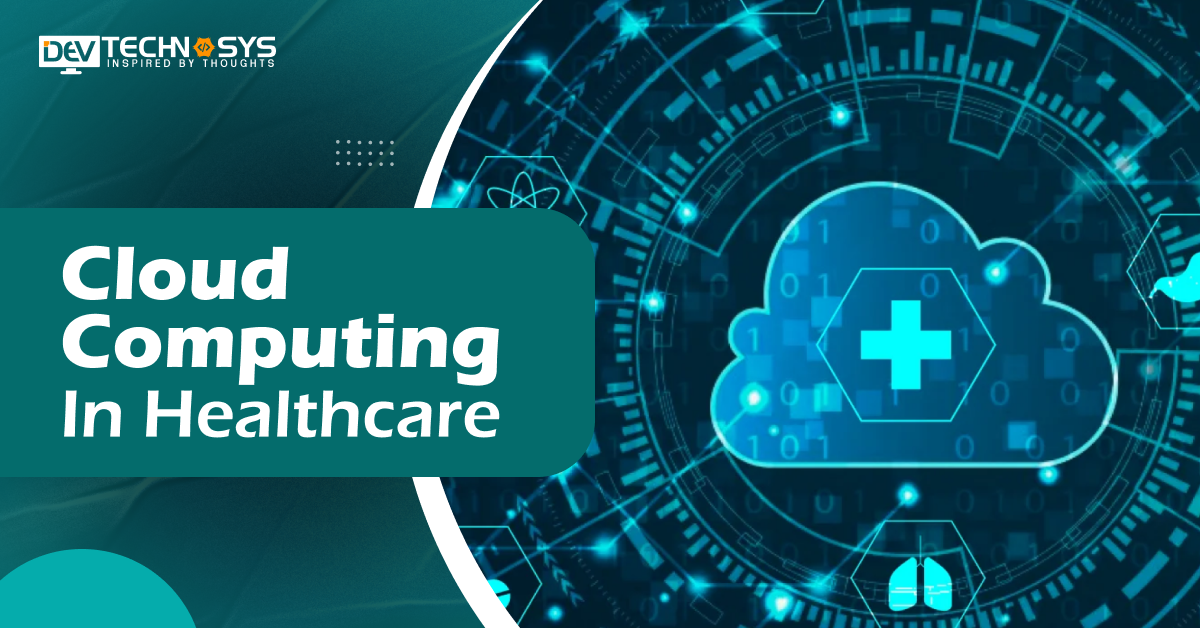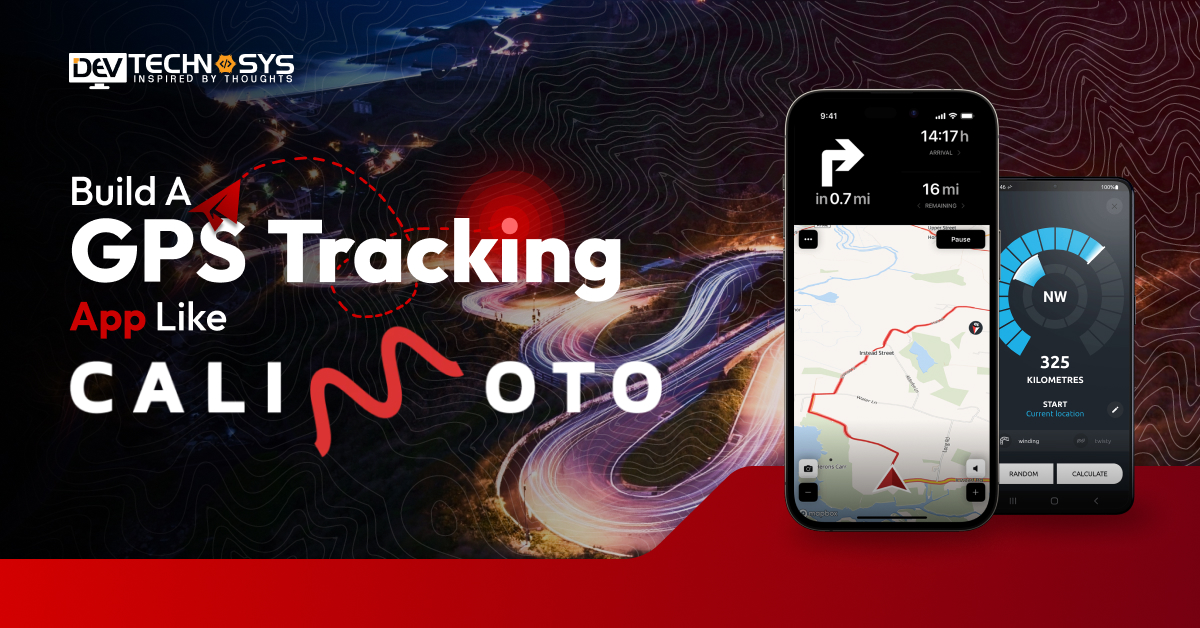“Medical cloud computing”
In this advanced world, people trust cloud computing to store their sensitive data and files. Cloud computing allows users to access data from anywhere or on any device, providing convenience and flexibility for users.
Cloud computing benefits doctors and patients by allowing them to access historical data and improving hospital management. It offers automated billing, tracking inventory, medical supply chain management, and patient data management.
According to a study, the healthcare cloud computing market size was valued at around $24.99 billion in 2023. It is projected to reach around $69.31 billion by the end of 2031.
This data depicts that investing in healthcare cloud computing can be a turning point for businesses looking to kickstart their careers.
In this blog, we will explore cloud computing in healthcare, its benefits, associated risks, and various types.
What Is Cloud Computing In Healthcare?
It offers remote services such as storing, managing, applications, and processing healthcare data. It provides benefits for both patients and healthcare organizations, such as accessing healthcare data, billing, and reports, and reducing data risks.
This can enhance the patient’s experience such as remote patient monitoring, personalized medicine, enhanced collaborations, and streamlined operations.
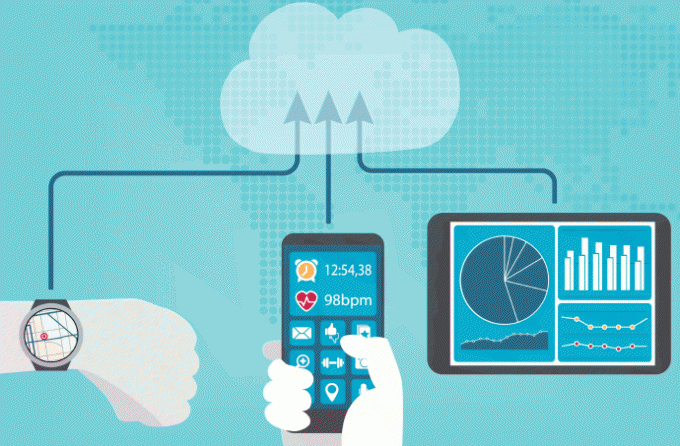
Cloud computing in the healthcare industry accesses cloud applications over the internet and maintains telehealth apps. If you want to know more about cloud computing services in healthcare, then reach out to a SaaS software development company.
- It has a larger data storage area to store the patient’s sensitive data such as lab reports and medical records.
- This platform offers vast security protection measures, such as biometrics, encryption, and two-factor authentication.
- Healthcare cloud computing reduces operational costs by offering automated operations and avoiding expensive hardware and software costs.
- It has the ability to observe the patient’s behavior, habits, and demographics to improve the patient’s experience and prediction of health outcomes.
Types of Cloud Computing In Healthcare
There are various different cloud computing types that provide many advantages for healthcare organizations. It offered various convenient services such as accessing, managing, security restrictions, operational efficiency, and more.
These can easily define all the operations done by cloud computing and enhance the healthcare organizations’ experiences. So, here we provide the robust types of healthcare cloud computing:
- Public Cloud
- Private Cloud
- Hybrid Cloud
- Community Cloud
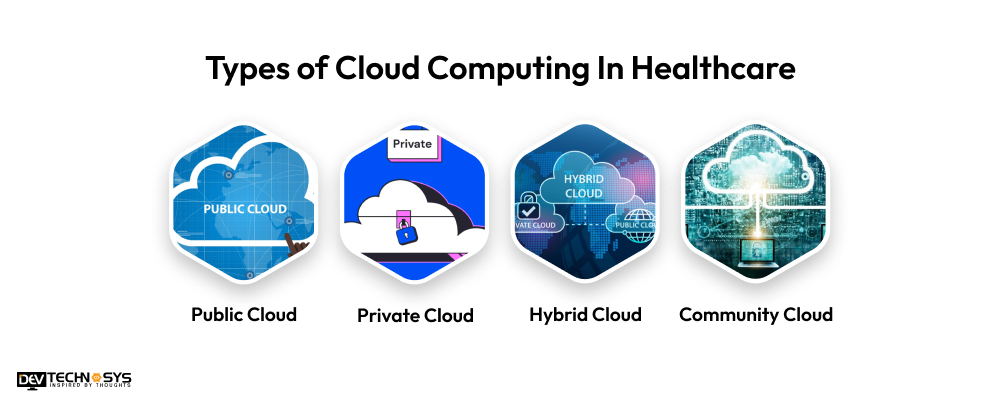
1. Public Cloud
Public cloud services operated by the third party vendors and offer various cloud services such as storage area, cloud applications, and servers. Healthcare organizations can purchase the public cloud services according to their requirements and it can manage by various external cloud vendors.
Advantages:
- It offers larger storages areas to store sensitive information of patients and it follow the pay-per-use model to reduce the cost.
- Healthcare agencies or organziations can easily manage their data and profiles on the cloud over the internet.
- This public cloud offers various advanced tools for patients to remote monitoring and the healthcare teams easily access the reports from anywhere.
2. Private Cloud
A private cloud is hosted for individual or single healthcare organizations and operated by the healthcare technical team. It allows only patients registered to the hosted healthcare organization to easily use the cloud services. Private clouds have the ability to increase security restrictions and control over data.
Advantages:
- It can cost more than the public cloud due to high-security measurements, dedicated resources, and hosting applications.
- This platform offers custom resources and provides secure data storage areas accessed by the admin or user panels.
- The private cloud has the ability to manage more sensitive data and control data security and compliance.
3. Hybrid Cloud
A hybrid cloud is one of the most used cloud infrastructures. It provides the functionality of both public and private clouds. Healthcare providers have the option to store sensitive data on the private cloud instead of the public cloud. According to the EMR mobile app development company, patients can access the data from anywhere and offer data backup capabilities.
- Hybrid cloud simply integrates with the public and private cloud, according to the healthcare providers’ requirements.
- It keeps sensitive data securely within a cost-effective budget and offers various cloud applications.
- Users have the convenience and flexibility to upload data on the public or private cloud as per the patients’ demands.
4. Community Cloud
A community cloud has the most popular and cost-effective cloud infrastructure and offers shared cloud services among various healthcare organizations. It includes many healthcare agencies, such as hospitals, clinics, and other healthcare organizations. This platform provides needs and requirements similar to those of various health agencies.
- It shared cloud computing services among a group of healthcare organizations that have similar requirements.
- It can easily reduce the cloud computing infrastructure cost because it can shared between the various healthcare agencies.
- This platform offers vast storage areas and easy access to sensitive data with proper security restrictions.
Interested in a chatbot demo, pricing, or more info? Fill out the form our expert will contact you shortly.
Chatbot Demo
Cost to Develop an app
Industry Report
Case Study
Cloud Computing Use Cases in Healthcare
Cloud computing in healthcare has many uses, thanks to its numerous benefits. How can cloud computing be used for healthcare? Let’s examine three of the more encouraging cases.
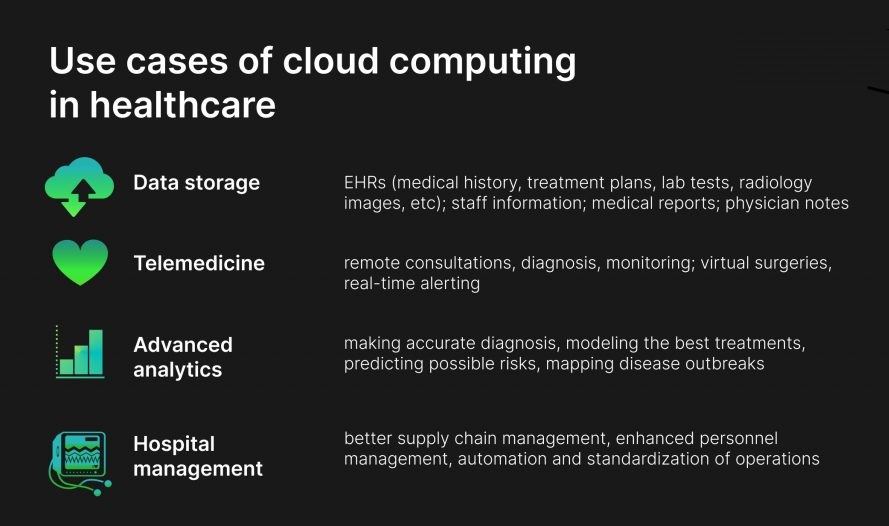
1. Data Storage
The healthcare industry handles a lot of data, representing 30% of all the world’s data. Because of this, it is essential to make sure it is maintained and preserved properly. Cloud computing is increasingly being used by healthcare organizations to take advantage of its enormous storage capacity. The cloud is able to store and process more healthcare data than traditional hardware.
Cloud environment connects to and processes data from different resources. It makes it easy to access, allows real-time sharing and can easily be backed up with all the data.
2. Telemedicine
Cloud computing has enabled the rise of telemedicine, which allows remote access to medical services. Cloud-based solutions allow for communication between healthcare professionals regardless of distance. This is especially useful for people living in remote areas that are unable to visit a hospital.
Cloud allows remote medical consultations, diagnosis and virtual surgery. Cloud-based telemedicine apps and platforms allow remote monitoring of medication intakes and health status at all stages. This is particularly useful for patients following surgery. Telemedicine allows doctors to monitor patients’ vitals via IoT wearables, and can respond to alerts that could save lives.
3. Accurate Diagnostics
According to Medical News Today today, diagnosing errors are the leading cause of medical errors in the United States. Misdiagnosis can lead to up to 80,000 deaths each year, and is often due to poor data management or a lack thereof.
AI-based cloud solutions, such as clinical decision support systems (CDSS), collect all relevant data from one place. This helps healthcare professionals improve their diagnosis accuracy and make data-driven decisions. AI also allows for predictive analytics, which helps identify trends and risks before they become serious problems.
AI-driven predictive analytics, for example, allowed researchers to create deep neural networks that forecast the risk of patient deaths based on ECG results. Before they exhibit any clinical symptoms, our model can recognize people who are at high risk.
4. Hospital Management
Cloud computing improves hospital management at many levels. Healthcare organizations can use centralized cloud data storage to monitor patients and simplify staff and supply chain management. If you develop a hospital management system software, it can quickly access and share medical information, track equipment location and track inventory. They can also manage doctor’s schedules easily without having to overlap.
Cloud computing in healthcare is a powerful tool for machine learning and AI that can automate routine tasks and optimize them. Technology does the heavy lifting in areas like document filling, billing, and reporting.
It is difficult to ignore the importance of cloud computing for healthcare. Cloud computing is used by some companies to simplify data management while others use it to build new technologies. Let’s look into the reasons why cloud computing is so popular.
Key Benefits of Cloud Computing in Healthcare
Below are the benefits of cloud computing in the healthcare that you must check out:
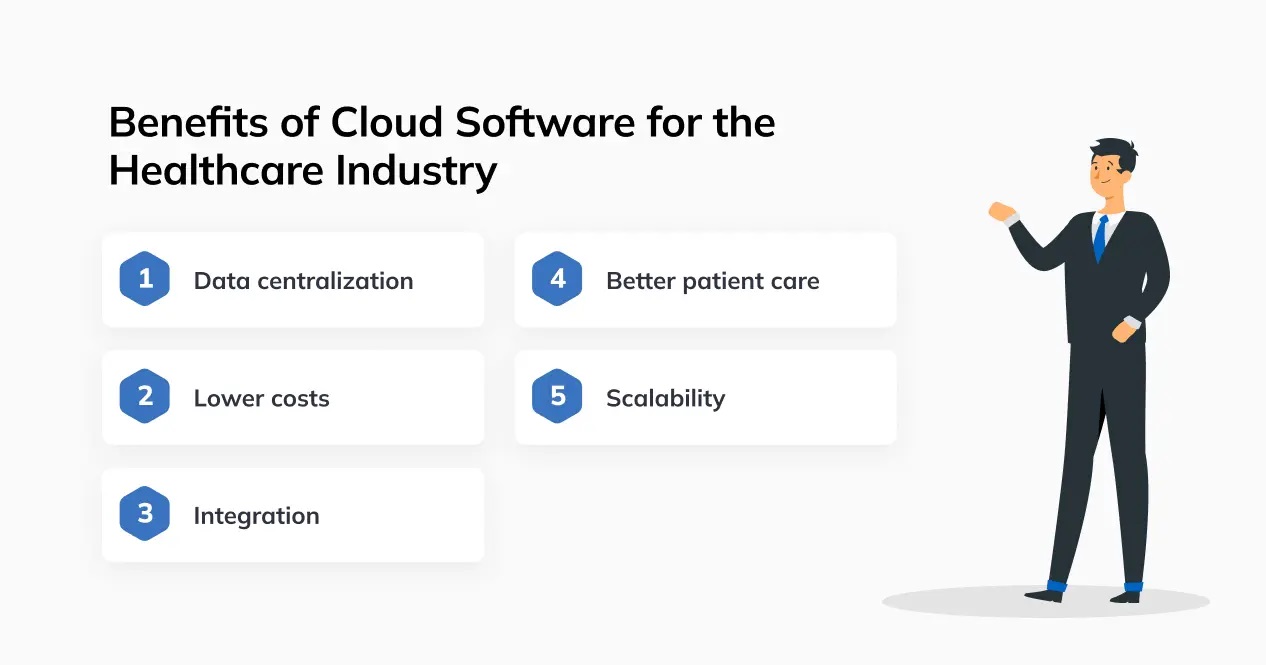
● Efficient Electronic Medical Record-Keeping
As part of the American Recovery and Reinvestment Act, the federal mandate for electronic health records went into effect January 1, 2014. Hospitals and other healthcare facilities must demonstrate that they use electronic medical records to store information about patient interactions. Cloud computing in healthcare is used in medicine to improve patient safety, efficiency, quality and safety.
The majority of hospitals and healthcare facilities today have stopped keeping paper records for their health records. Instead, they are using cloud storage to store them. Healthcare workers including doctors, nurses, and others have access to cloud-based electronic health records.
● Streamlined Collaborative Care For Patients
Cloud storage has made it easier to collaborate on patient care in America. Cloud storage allows doctors to view and share patient’s medical records in a more collaborative manner.
It was common for patients to have separate medical records at each specialist, hospital or doctor. It was challenging for doctors to collaborate on patient treatment as a result.
Particularly in connection to electronic medical records, cloud storage is growing in popularity in hospitals. This makes it simpler for physicians and patients to connect with and interact with one another. It also allows them to provide care that fully considers the history of the patient with other doctors.
● Reduced Data Storage Costs
To establish on-site storage, you will need to invest in hardware. You will also need to purchase hard drives and additional IT infrastructure to ensure that your data is always accessible and secure.
The development, upkeep, and management of cloud data storage services are handled by suppliers of cloud-based healthcare solutions. This enables medical professionals to concentrate on what they do best—treat patients.
● Superior Data Security
The risk of data loss or damage was high for physicians who stored patient records in filing cabinets in the past. Paper records can be easily lost or stolen and could be destroyed completely by fire, flood, or other natural disasters. Due to the absence of protection surrounding these records, patient safety was in jeopardy.
Healthcare providers can establish their own data storage infrastructure on site once the EMR mandate has been established.To guarantee that patient data is safeguarded, it would be necessary to maintain IT professionals that are knowledgeable in data security.
Healthcare providers can also outsource data storage to HIPAA-compliant cloud storage companies. These services offer data storage for patient EMRs that meet legally mandated privacy and security requirements. The cloud has made it possible for every healthcare provider to access a data storage solution that adequately protects patient’s sensitive information.
What are the Different Models of Healthcare Cloud Computing?
There are many models of cloud computing application development that can be used in healthcare.
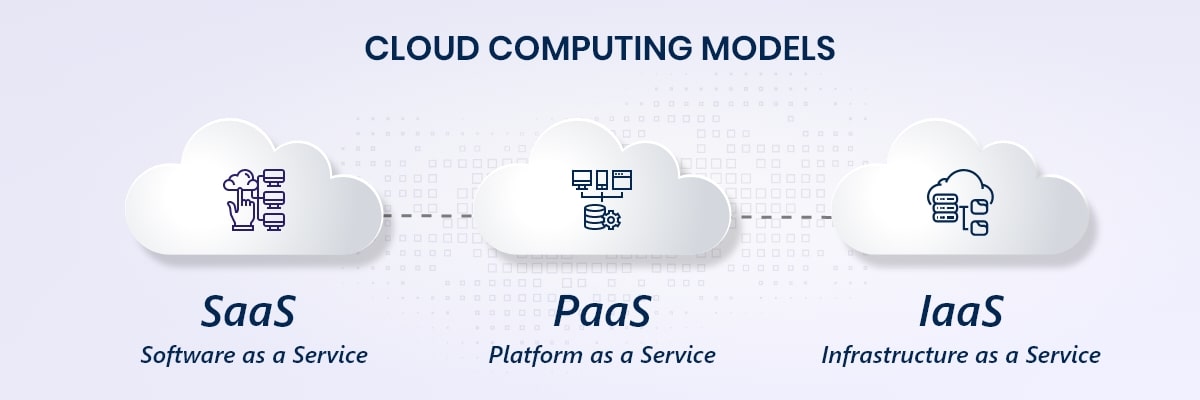
1. Infrastructure-as-a-Service (IaaS):
A medical institution might seek access to a third-party technology provider’s physical premises, such servers, data centers, memory clusters, and other crucial IT infrastructure. This is a great option for large and medium-sized businesses and projects that need to use third-party data centers in order to reduce IT infrastructure costs and maintenance.
2. Platform-as-a-Service (PaaS):
Healthcare software and services may be developed, tested, deployed, and migrated using cloud infrastructure with the help of a cloud provider in a virtual web-based environment. This is possible for medical organizations and/or IT contractors. Software developers can save money by renting tools and hardware rather than purchasing expensive server equipment and running their applications locally.
3. Software-as-a-Service (SaaS):
According to this concept, access to pre-built cloud-based apps and services is available for purchase by medical practitioners. SaaS usually comes with a monthly or annual subscription. Create a SaaS platform allows organizations and healthcare professionals to save money on full licenses or building products from scratch.
Features of Cloud Computing In Healthcare
But you are aware that what type of feature you must add on it. So, here we proivdes the premium features that can enhance the app’s performance and reachibility:
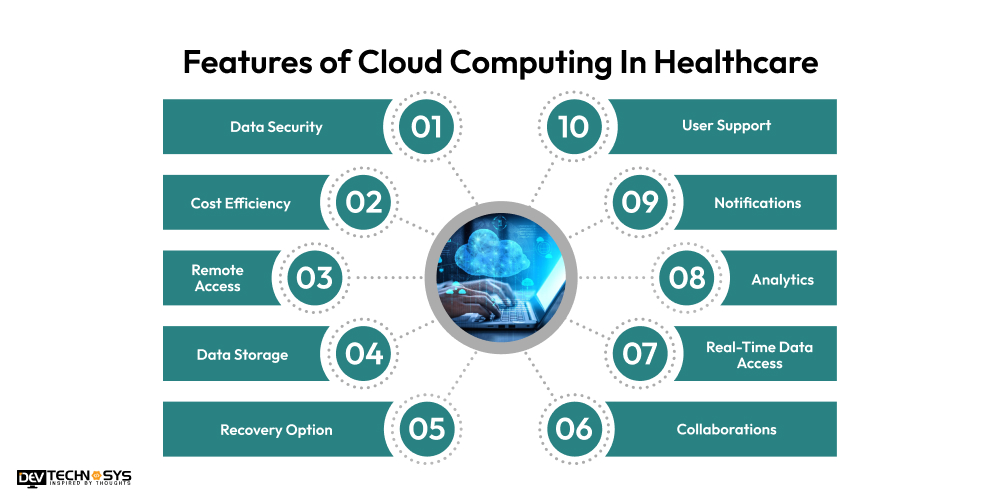
1. Data Security
It provides various data security methods that can protect the users data such as encryption, regular backups, two-factor authentication, and bio-metrics.
2. Cost Efficiency
This platform can reduce the operational cost by offering cloud applications services such as billing software, medical reports, and more.
3. Remote Access
This cloud computing allows healthcare team to access the patients sensitive data to monitoring their health reports and improvement analysis.
4. Data Storage
It offers vast cloud data storage areas and unlimited accessibility to patients’ sensitive information, including medical reports, lab reports, and more.
5. Recovery Option
Provides various recovery options as regular backups, such as automated recovery backups, and protects patients’ sensitive information.
6. Collaborations
This platform allows for secure communication between healthcare organizations and patients, which can enhance the user and healthcare team experience.
7. Real-Time Data Access
It allows patients to access their lab results and medical reports and the treatment diagnosis in real-time. To integrate this feature in your system, contact with an SaaS development company.
8. Analytics
It offers data analytics tools to observe patient data, behaviors, habits, preferences, and demographics to improve overall health.
9. Notifications
This platform sends messages to patients as reminders for daily checkups, medical report downloads, lab report images, and more.
10. User Support
If patients or healthcare organizations has issue related to the cloud computing services, then they contact with customer care via email, chat, and call.
Risks of Cloud Computing In Healthcare
There are many risks and challenges in healthcare cloud computing such as data security and managing high volume data storage. For the better use of cloud computing services, you must need to understand these risks to avoid them efficiently. So, here we provide the list of the risks in healthcare cloud computing:
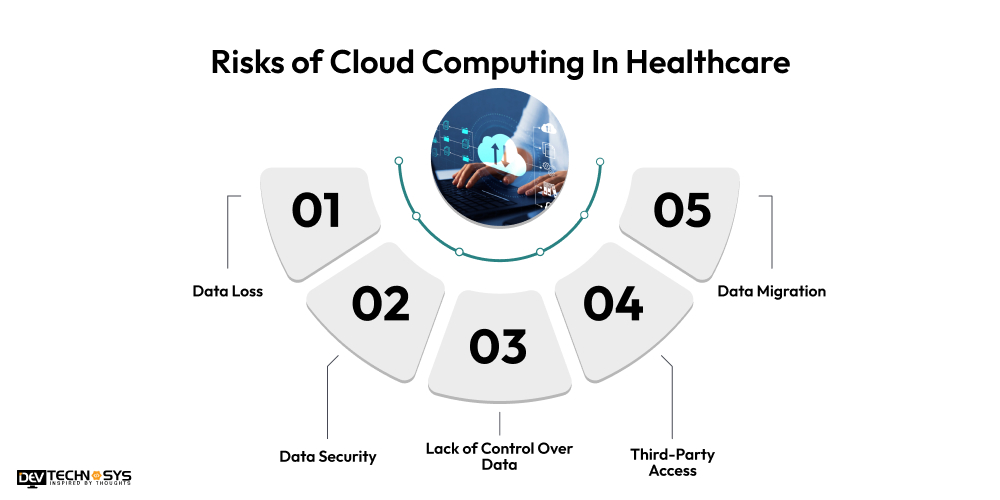
1. Data Loss
One of the most common risks in cloud computing is human or manual errors and technical issues. These can highly impact patient health because they can result in the loss of previous health records, images of lab reports, and other sensitive health record data. So, to prevent these, perform regular data backups in secure storage areas.
2. Data Security
Let’s move to the second risk: security concerns can lead the way to access the data from a third party. As we discussed earlier with a mental health EHR software development company, cloud services have raised security issues due to hacking, data breaches, and thefts. So, need to implement high security measures, such as encryption, two-factor authentication, and HIPAA.
3. Lack of Control Over Data
This third risk, as we discussed earlier about the various types of cloud computing, is that there is less control over data in such cloud infrastructures. Because of third-party cloud vendors, they have more control over data stored, accessed, and managed. So, before storing the data, clear service level agreements and major security controls must be made.
4. Third-Party Access
Let’s come to the fourth risk: various third-party cloud computing vendors can easily access patients’ sensitive information. This can directly lead to data breaches, thefts, hackers, and unauthorized access by externals. Hire healthcare app developers to protect against data leakage, we must follow regular security audits and implement strong security restrictions.
5. Data Migration
In this last risk, storing a large volume of user data can lead to data migration and corruption. Due to this, it displays incomplete data, and it can affect the patient’s health and operations. So, working with professional cloud computing vendors can ensure the data is securly stored and smoothly accessed the data from anywhere.
Real-World Example of Cloud Computing In Healthcare
Are you looking for successful healthcare business app development, but you don’t know how it can be implemented in the real world? With the help of SaaS software development services provider, it offers various real-world examples that use various cloud computing services. Integrating cloud computing services in healthcare can enhance patients’ experiences and improve their health.
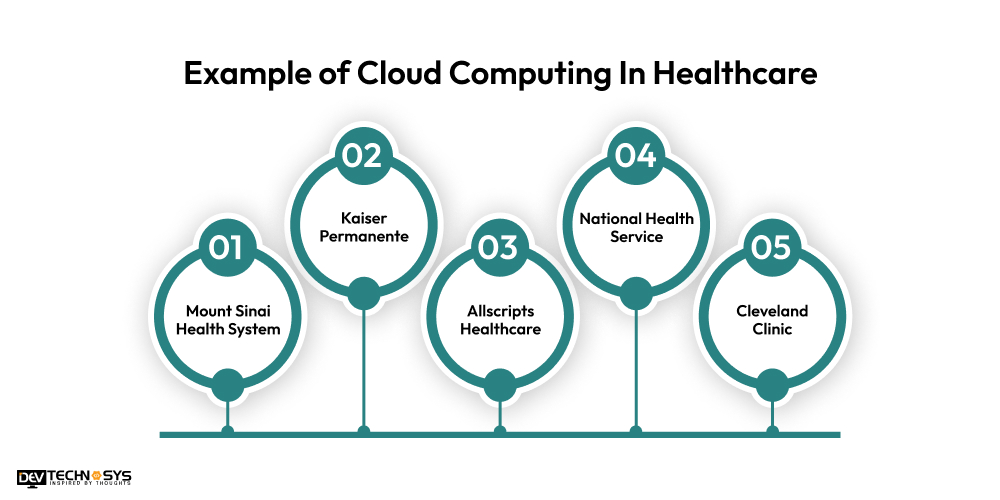
1. Mount Sinai Health System
Mount Sinai Health System is one of the largest hospital network systems in New York. It integrates with cloud computing to foster healthcare operations and enhance the patient experience. It integrates with AWS (Amazon Web Services) to improve customer service, data storage, accessibility, and security measurements. It was founded in September 2013.
2. Kaiser Permanente
Kaiser Permanente is the most popular healthcare organization that manages a wide variety of hospitals and clinics. It uses Microsoft Azure as a cloud service provider to improve patient healthcare operations and manage high-volume sensitive data. According to the SaaS software development company, it has various types of cloud applications, such as mobile apps, cloud-based EHR, data analytics, and AI.
3. Allscripts Healthcare
Allscripts Healthcare is a healthcare company that offers electronic health records to provide correct treatment to patients. It offers many advanced healthcare tools, such as practice management, data analytics, and other healthcare software solutions. It integrates with Microsoft Azure cloud services that can improve the patient’s overall health and share health data with the healthcare team.
4. National Health Service
National Health Service is the second-largest healthcare payer system, providing various services such as hospitals, clinics, and pharmacies. It uses Microsoft Azure to streamline healthcare operations, such as improving patient care, billing, medical reports, lab images, and medical treatment. It has the ability to provide the publicly funded the various healthcare organizations in England.
5. Cleveland Clinic
Cleveland Clinic is a medical center that offers many hospitals and clinics enhanced services, such as improved data storage, patient care, and more. This medical center uses the Google cloud to enhance the patient and healthcare team experience. As we compare to other companies, it can provide various cloud applications, such as Artificial Intelligence, telemedicine tools, and data storage.
The Cost of Cloud Computing In Healthcare
The healthcare app development cost is basically depends on the various factors that can highly impact the overall development cost. It includes infrastructure, complexity, size, deployment platforms, development team, and maintenance.
The cost can be fluctuate during the development phase because it has high number of implementation phases. The average cost of healthcare cloud computing is around $8,000 to $25,000 or more. So, here we provide the cost table that can easily evaluate the overall development cost:
Cloud Computing In Healthcare App Development |
Estimated Cost |
Time Frame |
|
Basic App Development |
$8000 – $13000 | 2 to 4 Months |
|
Mid-Complex App Development |
$14000 – $21000 | 5 to 8 Months |
|
High-Complex App Development |
$25000+ | 9+ Months |
The healthcare app maintenance services cost is around 15% to 20% of overall development, and it involves many maintenance phases. It includes networking, user support, security measurements, testing, updates, and bugs or glitches fixing.
Future of Cloud Computing In The Health Organization Industry
The future of cloud computing in health organizations can provide highly efficient operations, such as billing formats, online patient monitoring, accessibility, and data storage areas. It offers various advanced cloud applications that can enhance both healthcare provider and patient experience. It includes Electronic health records(EHR), data storage, telemedicine, backups, collaborations, CDSS, patient portals, healthcare mobile apps, and Artificial Intelligence.
It can easily process a large volume of sensitive data and identify the patient’s patterns, habits, demographics, and personalized treatments. As the days go by, the demand for cloud computing systems and applications in healthcare becomes more and more with advanced technologies.
How Dev Technosys Will Help You?
Now that we are on the last blog, we will explore cloud computing in healthcare and how cloud computing is used in healthcare. We will provide future market statistics for why investing in cloud computing is a good idea and explain various types of cloud computing that help to improve healthcare operations.
After that, we provide premium features that can help patients and healthcare organizations easily navigate all the services. Finally, we explored the risks or challenges of cloud computing in healthcare and real-world examples that use cloud computing services.
Do you want to integrate cloud computing into the healthcare department? Reaching out to an mobile app development company, to deliver robust development solutions.
Frequently Asked Questions
1. What Are The Benefits of Cloud Computing In The Healthcare Industry?
There are various cloud computing benefits in healthcare. They are:
- Cost savings
- Real-time data analytics
- Increased efficiency
- Remote patient monitoring
- Better security
2. What Are Some Popular Use Cases for Cloud Computing?
There are many popular use cases for cloud computing in the healthcare that enhance the patient’s overall health and experience. So, here is the list:
- Data backups
- File storage
- Communication
- Social networking
- Data Analytics
3. Which Cloud Computing Platforms Are Best For Healthcare Departments?
It includes various popular cloud computing platforms that provide convenience and flexibility for healthcare departments, such as:
- AWS
- Google Cloud Platform
- IBM Cloud
- Microsoft Azure
- Oracle Cloud
4. What Are The Applications of Cloud Computing?
It involves the best applications of cloud computing that provide robust cloud services:
- Cloud Storage Services
- Cloud Backup Solutions
- Cloud-Based Social Media Platforms
- Gaming Services
- Cloud-Based Solutions
